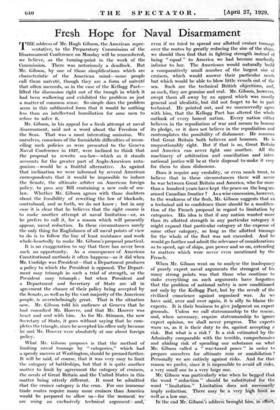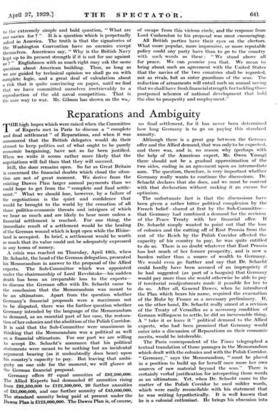Fresh Hope for , Naval Disarmament 111HE address of Mr. Hugh
Gibson, the American repre- sentative, to the Preparatory Commission of the Disarmament Conference on Monday will be remembered, we believe, as the turning-point in the work of the Commission. There was _ notoriously a deadlock. But Mr. Gibson, by One of those simplifications which are characteristic of the American mind,-;--some people call them naivete, though they are a form of naivete that often suceeeds, as in the case of the Kellogg Pact— lifted the discussion right out of the trough in which it had been wallowing and exhibited the problem as just a matter of common sense. So simple does the problem seem in this sublimated form that it would be nothing less than an intellectual humiliation for sane men to refuse to solve it.
Mr. Gibson, in his appeal for a fresh attempt at naval disarmament, said not a word about the Freedom of the Seas. That was a most interesting omission. We ourselves, conscious of the formidable difficulties of recon- ciling such policies as were presented to the Geneva Naval Conference in 1927, were inclined to think that the proposal to rewrite sea-law—which as it stands accounts for the greater part of Anglo-American anta- gonism—would be a fruitful alternative. As against that inclination we were informed by several American correspondents that it would be impossible to induce the Senate, the ultimate arbiter on American foreign policy, to pass any Bill containing a new code of sea- law. Whether Mr. Gibson agrees with those doubters about the feasibility of rewriting the law of blockade, contraband, and so forth, we do not know ; but in any case it is clear that he believes that the right course is to make another attempt at naval limitation—or, as he prefers to call it, for a reason which will presently appear, naval reduction. In these circumstances surely the only thing for Englishmen of all naval points of view to do is to follow the line of least resistance and work whole-heartedly to make Mr. Gibson's proposal practical.
It is no exaggeration to say that there has never been such an opportunity. As a consequence of American Constitutional methods it often happens—as it did when Mr. Coolidge was President—that a Department produces a policy to which the President is opposed. The Depart- ment may triumph in such a trial of strength, or the President may triumph ; but when President and a Department and Secretary of State are all in agreement the chance of their policy being accepted by the Senate, as well as by the vast majority of the American' people, is overwhelmingly great. That is the situation now. Mr. Gibson -told his audience at Geneva that he had consulted Mr. Hoover, and that Mr. Hoover was heart and soul with him. As for Mr. StimsoO, the new Secretary of State, it goes without 'saying that he com- pletes the triangle, since he accepted his office only because he and Mr. Hoover were- absolutely at one about foreign policy.
What Mr. Gibson proposes is that the method of limiting naval tonnage by " categories," which had a speedy success at Washington, should be' pressed further. It will be said, of course, that it 'was very easy to limit the category of battleships, but that it is quite another matter to- limit by agreement the category .of cruisers, the needs of Great Britain and the United States,. in this matter being utterly different. It must be admitted that the cruiser category is the crux: For our immense' trade routes require many more druiSers. than America would be prepared to allow •us-for the moment' are using an exclusively technical argument=-aiid,— even if we tried to spread our, allotted cruiser tonnage over the routes by greatly reducing the size of the ships, we should then find that in fighting strength instead of being " equal " to America we had become markedly inferior to her. The Americans would naturally build a comparatively small number of . the largest size of cruisers, which would . answer their particular needs but which would be able to blow little. vessels out of _the sea. Such are the technical British objections, and, as such, they are genuine and real. Mr. Gibson, however, swept them all away by an appeal which was mostly general and idealistic' , but did not forget to be in part technical. He pointed out, and we unreservedly agree with him, that the Kellogg Pact has altered the whole outlook of every honest- nation. Every nation either believes in the repudiation of war and means to honour its pledge, or it does not believe in the repudiation and contemplates the possibility of dishonour. . He assumes that Great Britain both believes and honours. He is unquestionably right. But if that is so, Great Britain and America can never fight one another. All the machinery of arbitration and conciliation and inter- national justice will be at -their disposal- to make it easy for them to shun dishonour. • Does it require any credulity, or even much trust, to believe that in these circumstances there will never be war between Great Britain and America, who for more than a hundred years have kept the peace on • the long un- armed Canadian frontier ? As a wise concession; however, to the weakness of the flesh, Mr. Gibson suggests that as a technical aid to confidence there should be a modifica- tion of the French proposal in regard to limitation by categories. His idea is that if any nation wanted more than its allotted strength in any particular Category it might expand that particular category at the expense of some other category, so long as 'the allotted tAnnage for the whole of the fleet was not exceeded.' And he would go further and admit the relevance of considerations as to speed, age of ships, gun power and-so on, extending to matters which were never even mentioned by the French.
When Mr. Gibson went on to analyse the inadequacy of purely expert naval arguments the strongest of his many strong points was that those who continue to stake everything on such arguments have, forgotten that the problem of national safety is now conditioned not only by the Kellogg Pact, but by the revolt 'of the civilized conscience against organized war. As we have said, over and over again, it is silly to blame the experts. It is their business to give judgment on expert grounds. Unless we all statesmanship to the rescue, and, when necessary, require statesmanship to -ignore expert opinion, we shall never progress. The experts warn us, as it is their duty to do, against accepting a risk. But what is a risk ? Is a risk estimated by the Admiralty comparable with the terrible, comprehensive and abiding risk of spending our substance on what Mr. Gibson called a " war-taxed peace " in order to prepare ourselves for ultimate ruin or annihilation'? Personally we are entirely against risks. And for that reason we prefer, since it impossible to avoid all risks, a very small one to a very large one. Mr. Gibson was particiilarlY wise when he begged that the word " redUcticin "ThhOuld be substituted for the word " limitation." LinnitatiOn does not necessarily imply reduction. There May be -a very high liinit-as _ well as a low one " --• - • . the end Mr.-Gibson's address broughthim, in effeet, to the extremely simple and bald question, " What are our navies for ? " It 'a-question -which is perpetually asked in America. The truth is that the signatories of the Washington Convention have no enemies except themselves. Americans say, " Why is the British Navy kept up to its present strength if it is not for use against ? " Englishmen with as much right may ask the same question about American building. Thus, so long as we are guided by technical opinion we shall go on with complete logic, and a great deal of calculation about a risk that is quite convincing on paper, until we find that we have committed ourselves irretrievably to a reproduction of the old naval competition. That is the sure way to war. Mr. Gibson has shown us the way of escape. from this vicious circle, and the response from • Lord CuShendun to hiS proposal was most encouraging. All British parties have their eyes on the electors. What more popular, more impressive, or more reputable policy could any party have than to go to the country with such words as these : " We stand above all for peace. We can promise you that. We mean to bring about such an agreement with the United States that the navies of the two countries shall be regarded, not as rivals, but as sister guardians of the seas. The redUction of armaments will entail sueh an annual saving that we shall have fresh financial strength for tackling those postponed Schenies. of national development that hold the clue to prosperity and employment."









































 Previous page
Previous page